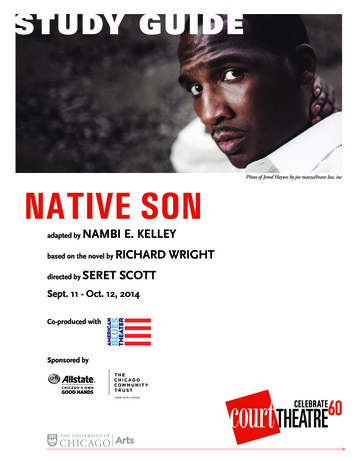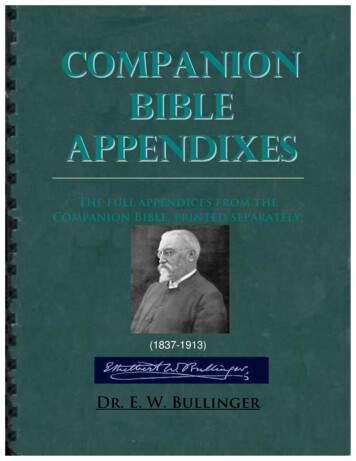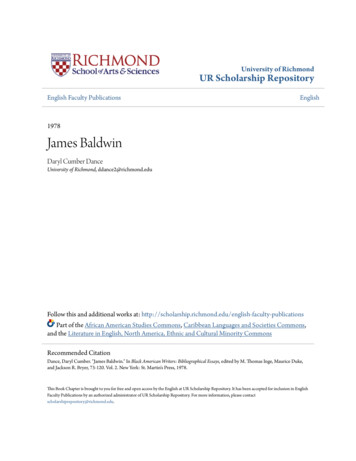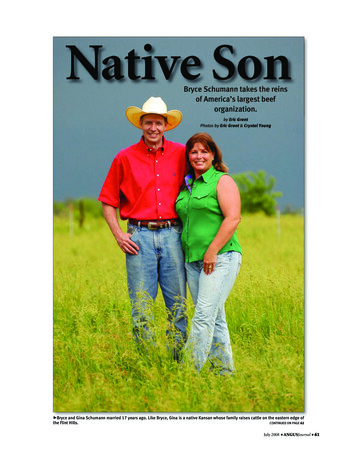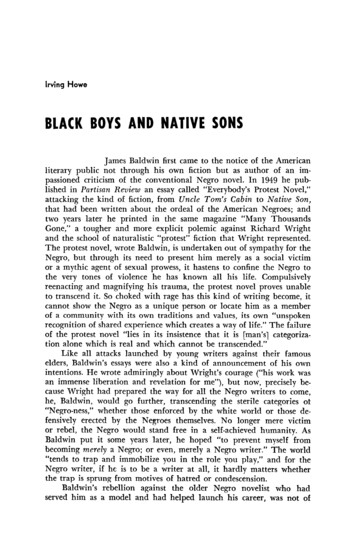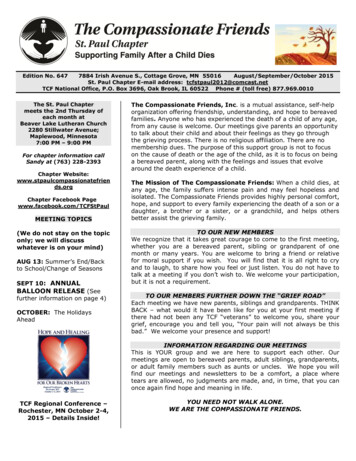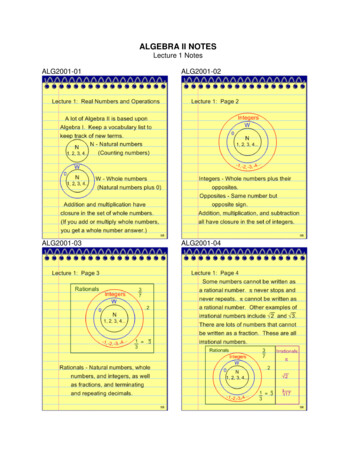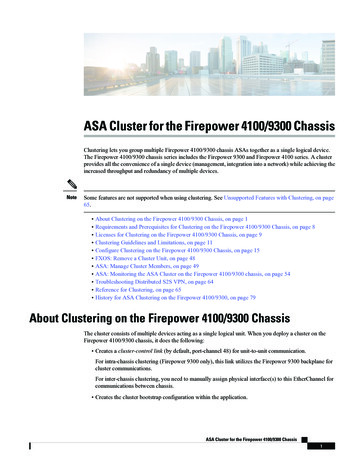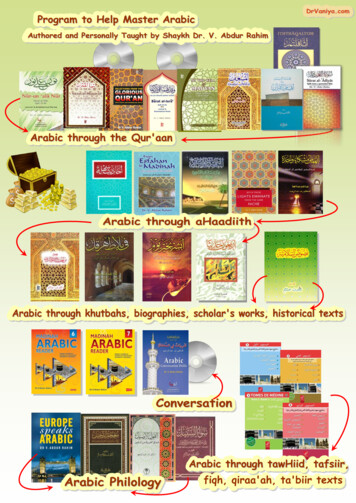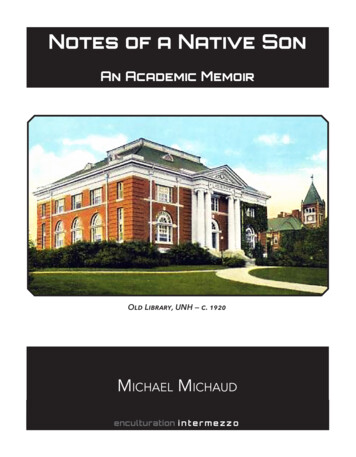
Transcription
Notes of a Native SonAn Academic MemoirOld Library, UNH — c. 1920Michael Michaudenculturation i n t e r m e z z o
Enculturation Intermezzo E nculturation , a Journal of Rhetoric, Writing, and Culture, announcesthe launch of Intermezzo, a series dedicated to publishing long essays –between 20,000 and 80,000 words – that are too long for journal publication,but too short to be a monograph. Intermezzo fills a current gap withinscholarly writing by allowing writers to express themselves outside of theconstraints of formal academic publishing. Intermezzo asks writers to notonly consider a variety of topics from within and without academia, but tobe creative in doing so. Authors are encouraged to experiment with form,style, content, and approach in order to break down the barrier betweenthe scholarly and the creative. Authors are also encouraged to contributeto existing conversations and to create new ones.I ntermezzo essays, published as ebooks, will broadly address topics ofacademic and general audience interest. Longform or Longreads essayshave proliferated in recent years across blogs and online magazine outletsas writers create new spaces for thought. While some scholarly presses havebegun to consider the extended essay as part of their overall publishing,scholarly writing, overall, still lacks enough venues for this type of writing.Intermezzo contributes to this nascent movement by providing new spacesfor scholarly writing that the academic journal and monograph cannotaccommodate.Essays are meant to be provocative, intelligent, and not bound to standardstraditionally associated with “academic writing.” While essays may beacademic regarding subject matter or audience, they are free to explorethe nature of digital essay writing and the various logics associated withsuch writing - personal, associative, fragmentary, networked, non-linear,visual, and other rhetorical gestures not normally appreciated in traditional,academic publishing. Intermezzo essays are meant to be speculative,exploratory, and a mix of the informal and the formal. Essays may comefrom a variety of disciplinary approaches or may mix approaches.Intermezzo is meant to be a venue where writers can produce scholarlywork in unique ways, outside of institutional or disciplinary expectation,and it takes advantage of digital media as a platform for both content anddistribution of timely topics.i
Intermezzo EditorsE ditor :A ssociate E ditors :Jeff Rice, University of KentuckyCasey Boyle, University of Texas-AustinJim Brown, Rutgers University-CamdenA ssistant E ditors :Eric Detweiler, Middle Tennessee State UniversitySergio C. Figueiredo, Kennesaw State UniversityE ditorial B oard :Eli C. Goldblatt, Temple UniversityDebra Hawhee, Pennsylvania State UniversityByron Hawk, University of South CarolinaCynthia Haynes, Clemson UniversityChrista Olson, University of WisconsinPaul Prior, University of Illinois at Urbana-ChampaignBlake Scott, University of Central FloridaScott Wible, University of Maryland INTERMEZZO ESSAYS are published as open source texts. are freely available for download. undergo peer review. take advantage of online distribution in order to publish projects quickly and efficiently. are designed for desktop and mobile digital reading platforms. are assigned an ISBN number in order to provide authors professional credibility and further accessibilityto global audiences.h t t p : / / i n t e r m e z z o . e n c u lt u r at i o n . n e tii
enculturation.netenculturationI SBN: 978-0-0864333-4-4PUBLISHED UNDER AN ATTRIBUTION-NONCOMMERCIAL-SHAREALIKE CREATIVE COMMONS LICENSEiii
Notesof aN at i v e S o nbyMichael MichaudIntermezzo2017
Notes of a Native SonBy Michael MichaudOriginally published by Intermezzo, 2017Published under an Attribution-Noncommercial-SharealikeCreative Commons LicesneISBN: 9 7 8 -0 -0864333-4-4Library of Congress Control Number: 2017944465Cover Image: “Old Library, UNH” [Edited] - Courtesy of Wikimedia Commonsintermezzo.enculturation.netv
AcknowledgementsThere are many people to thank for their help with this project. First and foremost,I’d like to thank Jeff Rice for his enthusiasm and editorial acumen. At the time whenhis CFP for “long-form academic autobiographies” came across my desk, I was in abind, trying to find a way to tell two connected but unconnected stories at the sametime—one about my UNH writing tribe and its emergence and evolution during thesecond half of the twentieth century and one about my own long-term engagementand affliation with the tribe.1I couldn’t see a way to tell both stories simultaneously and do each justice. Jeffprovided me with the space to tell one of the two stories, and for that I am grateful.I’d also like to thank the Intermezzo reviewers for their pointed and useful feedback;Sergio Figueiredo for his patient and generous work on the book’s design; and EricDetweiler for his helpful editorial suggestions.I’d like to thank members of my UNH writing tribe who read or discussed this manuscriptwith me while it was still in process: Tom Newkirk, Bonnie Sunstein, Bronwyn Williams,Jeff Ringer, Bruce Ballenger, and Mike DePalma. I’d like to thank Tom Carnicelli, LesterFisher, and Donald Murray for their willingness to be interviewed before they or I knewexactly how our discussions would be useful. I’d like to thank Mylinda Woodward,Assistant University Archivist at the University of New Hampshire, for more than a halfdozen years of assistance in the archives, and David Shedden of the Poynter Institutefor generously agreeing to help me access Donald Murray’s archives from afar. Finally,I’d like to thank all of the UNH tribesmen and -women who I’ve not mentioned herebut who have welcomed me into the tribe, made me feel at home, taught me, andaffirmed me and my work as a member of the tribe over twenty-five years. Recently,at the 2017 Conference on College Composition and Communication, I found myselfracing back and forth from one end of the convention center to another betweensessions as I worked to find rooms and exhibit spaces I wanted to visit. On each trip Iseemed to run into yet another UNHer. This experience helped me to understand andappreciate, yet again, how lucky I am to count myself a member of our community ofteachers, writers, and scholars.I’d like to thank my collaborator Sarah Read for many years of productive discussionsthat inevitably touched the production of this book, and Kevin Roozen, who affirmedthe value of the project at a moment when it (or I) needed affirmation.Finally, I’d like to thank members of my family—my wife, partner, and officemate,Shelagh, and my children, Emma and Will. Thanks for your patience, love, and support.vi
ContentsAcknowledgements . . . . . . . . . . . . . . . . . . . . . . . . . . . . . . . . . . . . . . . . . . . . . . . . . viIntroduction . . . . . . . . . . . . . . . . . . . . . . . . . . . . . . . . . . . . . . . . . . . . . . . . . . . 1Chapter I: In Freshman English . . . . . . . . . . . . . . . . . . . . . . . . . . . . . . . . . . . . . . . 4Chapter II:A Brief Digression on Pioneers . . . . . . . . . . . . . . . . . . . . . . . . . . . . . . . . . . . . . . 11Chapter III: Coming to Voice, Part I . . . . . . . . . . . . . . . . . . . . . . . . . . . . . . . . . . . 15Chapter IV: Coming to Voice, Part II . . . . . . . . . . . . . . . . . . . . . . . . . . . . . . . . . . . . 20Chapter V: Coming to Voice, Part III . . . . . . . . . . . . . . . . . . . . . . . . . . . . . . . . . . . . 26Chapter VI: On Meeting Great and Famous Men . . . . . . . . . . . . . . . . . . . . . . . . . . . . . . . . 30Chapter VII: Teacher, Writer, Scholar, Part I . . . . . . . . . . . . . . . . . . . . . . . . . . . . . . . . 37Chapter VIII: Teacher, Writer, Scholar, Part II . . . . . . . . . . . . . . . . . . . . . . . . . . . . . . . . . . . 43Chapter IX: Teacher, Writer, Scholar, Part III . . . . . . . . . . . . . . . . . . . . . . . . . . . . . . . . . . 51Chapter X: : A UNH Writing Teacher Teaching a UNH Writing Course . . . . . . . . . . 57Chapter XI: Internalizing the Tribe’s Foundational Myth . . . . . . . . . . . . . . . . . . . . . . . . . . . 60Chapter XII: My Top 5 List of the UNH Writing Tribe’s Key Beliefsand Assumptions about Writing and Its Teaching. . . . . . . . . . . . . . . . . . 65Chapter XIII: My Top 5 List of Key Traits of a UNH Writing Teacher . . . . . . . . . . . . . . . . . . 76Chapter XIV: Quarter-Life Crisis . . . . . . . . . . . . . . . . . . . . . . . . . . . . . . . . . . . . . . . . . . 87Chapter XV: A Brief Lost-in-the-Wilderness Period . . . . . . . . . . . . . . . . . . . . . . . . . . . 90Chapter XVI: A Learning Story . . . . . . . . . . . . . . . . . . . . . . . . . . . . . . . . . . . . 93Chapter XVII: Cracksin theChapter XVIII: BuyingintoFaçade . . . . . . . . . . . . . . . . . . . . . . . . . . . . . . 99Binaries . . . . . . . . . . . . . . . . . . . . . . . . . . . 103vii
Chapter XIX: Divided . . . . . . . . . . . . . . . . . . . . . . . . . . . . . . . . . . . . . . . 107Chapter XX: Can’t Go Home . . . . . . . . . . . . . . . . . . . . . . . . . . . . . . . . . . . . 112Chapter XXI: A Way Out, Part I: The DiscoveryofOptions . . . . . . . . . . . . . 116Chapter XXII: A Way Out, Part II: A Usable Past . . . . . . . . . . . . . . . . . . . . . . 121Epilogue . . . . . . . . . . . . . . . . . . . . . . . . . . . . . . . . . . . . . . . . . . . 129Endnotes . . . . . . . . . . . . . . . . . . . . . . . . . . . . . . . . . . . . . . . . 132References . . . . . . . . . . . . . . . . . . . . . . . . . . . . . . . . . . . . . . . . . . 140
L is tFiguresofFigure 1. . . . . . . . . . . . . . . . . . . . . . . . . . . . . . . . . . . . . . . . . . 2Figure 2. . . . . . . . . . . . . . . . . . . . . . . . . . . . . . . . . . . . . . . . . . 5Figure 3 . . . . . . . . . . . . . . . . . . . . . . . . . . . . . . . . . . . . . . . . . . 10Figure 4 . . . . . . . . . . . . . . . . . . . . . . . . . . . . . . . . . . . . . . . . . . 12Figure 5 . . . . . . . . . . . . . . . . . . . . . . . . . . . . . . . . . . . . . . . . . . 13Figure 6 . . . . . . . . . . . . . . . . . . . . . . . . . . . . . . . . . . . . . . . . . . 18Figure 7 . . . . . . . . . . . . . . . . . . . . . . . . . . . . . . . . . . . . . . . . . . 22Figure 8 . . . . . . . . . . . . . . . . . . . . . . . . . . . . . . . . . . . . . . . . . . 23Figure 9 . . . . . . . . . . . . . . . . . . . . . . . . . . . . . . . . . . . . . . . . . . 24Figure 10 . . . . . . . . . . . . . . . . . . . . . . . . . . . . . . . . . . . . . . . . . . 27Figure 11 . . . . . . . . . . . . . . . . . . . . . . . . . . . . . . . . . . . . . . . . . . 28Figure 12 . . . . . . . . . . . . . . . . . . . . . . . . . . . . . . . . . . . . . . . . . . 29Figure 13 . . . . . . . . . . . . . . . . . . . . . . . . . . . . . . . . . . . . . . . . . . 32Figure 14 . . . . . . . . . . . . . . . . . . . . . . . . . . . . . . . . . . . . . . . . . . 35Figure 15 . . . . . . . . . . . . . . . . . . . . . . . . . . . . . . . . . . . . . . . . . . 39Figure 16 . . . . . . . . . . . . . . . . . . . . . . . . . . . . . . . . . . . . . . . . . . 46Figure 17 . . . . . . . . . . . . . . . . . . . . . . . . . . . . . . . . . . . . . . . . . . 47Figure 18 . . . . . . . . . . . . . . . . . . . . . . . . . . . . . . . . . . . . . . . . . . 48Figure 19 . . . . . . . . . . . . . . . . . . . . . . . . . . . . . . . . . . . . . . . . . . 49Figure 20 . . . . . . . . . . . . . . . . . . . . . . . . . . . . . . . . . . . . . . . . . . 52Figure 21 . . . . . . . . . . . . . . . . . . . . . . . . . . . . . . . . . . . . . . . . . . 53Figure 22 . . . . . . . . . . . . . . . . . . . . . . . . . . . . . . . . . . . . . . . . . . 58ix
Figure 23 . . . . . . . . . . . . . . . . . . . . . . . . . . . . . . . . . . . . . . . . . . 61Figure 24 . . . . . . . . . . . . . . . . . . . . . . . . . . . . . . . . . . . . . . . . . . 67Figure 25 . . . . . . . . . . . . . . . . . . . . . . . . . . . . . . . . . . . . . . . . . . 70Figure 26 . . . . . . . . . . . . . . . . . . . . . . . . . . . . . . . . . . . . . . . . . . 70Figure 27 . . . . . . . . . . . . . . . . . . . . . . . . . . . . . . . . . . . . . . . . . . 71Figure 28 . . . . . . . . . . . . . . . . . . . . . . . . . . . . . . . . . . . . . . . . . . 73Figure 29 . . . . . . . . . . . . . . . . . . . . . . . . . . . . . . . . . . . . . . . . . . 75Figure 30 . . . . . . . . . . . . . . . . . . . . . . . . . . . . . . . . . . . . . . . . . . 80Figure 31 . . . . . . . . . . . . . . . . . . . . . . . . . . . . . . . . . . . . . . . . . . 86Figure 32 . . . . . . . . . . . . . . . . . . . . . . . . . . . . . . . . . . . . . . . . . . 89Figure 33 . . . . . . . . . . . . . . . . . . . . . . . . . . . . . . . . . . . . . . . . . . 95Figure 34 . . . . . . . . . . . . . . . . . . . . . . . . . . . . . . . . . . . . . . . . . . 97Figure 35 . . . . . . . . . . . . . . . . . . . . . . . . . . . . . . . . . . . . . . . . . . 100Figure 36 . . . . . . . . . . . . . . . . . . . . . . . . . . . . . . . . . . . . . . . . . . 102Figure 37 . . . . . . . . . . . . . . . . . . . . . . . . . . . . . . . . . . . . . . . . . . 113Figure 38 . . . . . . . . . . . . . . . . . . . . . . . . . . . . . . . . . . . . . . . . . . 123
EpigraphI think when you enter a disciplinary field is significant. The cultural and historical point of entry continues to shape and influence your thinking. You don’tleave that culture behind. You don’t replace it. If you are a learner, you expandit, you deepen it, you complicate it, you re-envision it. But that culture remainspart of you. Donna Qualley,“Discovering from the Specifics”
Introduction
Notes of a Native SonIn the introduction to their book, 1977: A Cultural Moment in Composition (2007), amicrohistory of writing instruction at the Pennsylvania State University,2 Brent Henze, Jack Selzer,& Wendy Sharer pose the following questions and then speculate about their answers:Figure 1 (transcription): “Why do people teach composition as they do at anygiven moment? What determines their choices of textbooks, assignments, anddaily classroom activities? Of all the possible approaches to the teaching ofwriting, why do teachers settle on particular ones? What accounts for the shape ofcomposition programs—sequences of courses, testing and placement procedures,staffing and administrative practices? Individual preferences and personal styles arecertainly involved; so, of course, are institutional values and constraints. But evenmore certainly, the teaching of composition is shaped by the available means ofpersuasion that are presented to us by intellectual and professional communities(broadly considered)—communities shaped, inevitably, by culture, circumstance, andhistory” (3).Following Henze, Selzer & Sharer, this essay is an inquiry into the available means ofpersuasion that have shaped my own development as a teacher of composition—an attemptto sort through my twenty-plus year association with the professional community that hasmost shaped my pedagogical trajectory and orientation, the University of New Hampshire(UNH) Department of English and, in particular, its tribe of writers, writing teachers, and writingscholars. Because intellectual and professional communities shape the identities of compositionteachers and not just the teaching of composition, this essay is also an effort to think through2
Michael Michaudthe ways in which the UNH writing tribe has shaped me into a certain kind of teacher, writer,scholar, and person in the world.3My enculturation process began with my initiation into the tribe in Freshman English inthe spring of 1993. From there, the journey ran through four years of undergraduate educationas an English major; two tours of graduate education at, first, the University of Iowa and, second,UNH; and then alumni status. During this journey, from Durham, New Hampshire, to Iowa, fromIowa to Boston and then back to Durham and, finally, to Providence, Rhode Island, where I nowteach in the English Department at Rhode Island College, I learned and then worked to spreadthe gospel of the tribe while simultaneously negotiating and renegotiating my changing rolewithin and orientation towards it. And all this time, I tried to teach my students the single mostimportant thing the UNH writing tribe has taught me, the very thing I will attempt to enact inthese pages: that through the act of writing, one can make greater meaning of one’s own life.This is my story.3
Chapter IIn Freshman English
Michael MichaudFigure 2 (transcription): “Writing is most important not as etiquette,not even as a tool, but as a contribution to the development of aperson, no matter what that person’s background and talents. “ Donald Graves,Balance the Basics: A Report to the Ford Foundation, 1978Discovering the passage above and the report from which it is drawn while conductingresearch for a book I am writing on the history of the University of New Hampshire EnglishDepartment was like stumbling on a box of old family letters written by a vaguely known relative.Don Graves’ words—written in 1978, fifteen years before I enrolled at UNH as anundergraduate student and discovered the curricular instantiation of this philosophy—give voiceto the generous, humane, romantic, reformist, and deeply democratic tradition I encounteredin the UNH English Department as an undergraduate English major in the early- to mid-1990s.My fortuitous introduction to “a contribution to the development of a person, no matter whatthat person’s background and talents” (6) began in the spring of 1993 when I enrolled in UNH’srequired first-year composition course, Freshman English.Having narrowly survived macroeconomics, calculus, and computer science, FreshmanEnglish was an oasis in the otherwise arid academic desert that was my first year of college. Ihad signed on at UNH as a business major, but quickly discovered that I was neither good at normuch interested in the business of business.I liked Freshman English, though, because it wasn’t like my other classes. First andforemost, there were no lectures or tests, no one cramming your head full of endless amountsof information and then examining you to see whether they had succeeded in packing you fullof all the things they already knew. In Freshman English there was reading, there was writing,there was thinking and talking and sharing. Lucky for me, these were things I was good at, thingsI could do, things I enjoyed doing, things that, in doing them, let me feel smart in ways that I5
Notes of a Native Sondidn’t always feel in school.In his article “Barriers to Revision,” UNH English Professor Thomas Newkirk, a keyarchitect of Freshman English program as I experienced it at UNH and twice the director,describes the details of the course in this way (and yes, the structure Newkirk describes belowwas still pretty much in place when I took the course in the spring of 1993):Unlike the traditional writing course where students usually receive only writtenresponses to their work, in [Freshman English] students [meet] once a week withthe instructor to discuss problems and possible revisions. Students [write] a threeto five page paper each week and [are] allowed to choose their own topics. Amajor revision of a piece [is] counted as a new paper, and students [are] gradedon their best two papers at the end of the course. (50)In this description of what I would later come to think of as not just Freshman Englishbut, instead, something far more profound and iconic, a UNH writing course, it’s worth notingthe lack of any clearly identifiable body of content. “Students [write] a three to five page papereach week and [are] allowed to choose their own topics.” This approach was a revelation to me,something entirely new under the sun. The subject of Freshman English was . . . me. Or, moreprecisely, the topics that I chose to write about. What a relief to find such a course after theprevious semester, during which I had spent days and nights slogging through papers on topicsthat I wouldn’t have chosen to write about had I been given the choice.But there was more to Freshman English than just three- to five-page papers andchoosing one’s own topics. Here’s an excerpt from The Freshman English Handbook, an inhouse booklet that was distributed to students enrolled in Freshman English during the 1990s:In [Freshman English], you will learn that good writing is much more thanjust putting together grammatically correct sentences that merely sum upinformation and ideas. Since Freshman English focuses as much on the draftsyou write as on the finished products, you will rediscover writing as a process ofinquiry that allows you—through the act of composing itself—to think and workyour way through issues and ideas and to articulate them in depth and detail.By writing in this way, you will not merely reflect the ideas of your teachers andother “authorities;” you will learn to actively and critically engage those ideasand formulate your own. In doing so, you will begin to play an integral role inyour own learning and in the processes of academic inquiry. When you write asan act of discovery—questioning and analyzing as you compose—you will learnto become a maker rather than passive absorber of knowledge, a critical thinker6
Michael Michaudand evaluator of words, ideas, and images, rather than just a consumer of factsand figures. (n.p.)As this passage makes clear, in addition to being a class in which the main content wasme and my interests, and in addition to being a course, per Donald Graves, that was guidedby the idea of “a contribution to the development of a person, no matter what that person’sbackground and talents,” Freshman English was an enterprise that was informed by a deepbelief in student-centered teaching and a desire to empower students as knowers. According tothe handbook, Freshman English was to shape me into a certain kind of person, one I perhapshadn’t been before. I was to become a maker rather than a passive absorber of knowledge, acritical thinker and not merely a consumer of facts and figures. Freshman English was interestedin not only writing (and reading), but in subject formation, in epistemological transformation.The passage from The Freshman English Handbook also makes reference to “theprocesses of academic inquiry,” and so it’s worth asking, because first-year compositionclasses are usually charged with introducing students to academic writing and research, what,if anything, I learned in the class about such work. The answer is that I don’t know. I neverassociated Freshman English with the term academic. I was having too much fun thinking andwriting about things that felt decidedly nonacademic—friends back home, love, loneliness, andmy new obsession, the rock-and-roll band The Doors. If anything, Freshman English seemeddecidedly antiacademic in the sense that it produced in me feelings (i.e., pleasure, curiosity, joy)that were the opposite of those I associated with academic work (i.e., boredom, insecurity, fear).I liked Freshman English precisely because it seemed so different from most or even all of theother courses I was taking or had taken at UNH up to that point.If I didn’t associate Freshman English with academic work, that may, as I discoveredrecently, have been by design. Despite what The Freshman English Handbook has to sayabout teaching “the processes of academic inquiry,” for some at UNH, including two-timeFreshman English Director Tom Newkirk, Freshman English was never intended to be anacademic endeavor of the traditional sort. In the introduction to his edited collection Nutsand Bolts: A Practical Guide to Teaching College Composition, Newkirk recounts the history7
Notes of a Native Sonof Freshman English at UNH from the early 1970s to the present in a section appropriatelynamed “The Purification of Freshman English.” “The central question in this history,” Newkirkwrites, “is this: what is the function of a writing course in the institution that requires it?” (3). Thetraditional answer, Newkirk acknowledges, is that a writing course is to function as a service tothe university, a place to help students learn to write for other academic courses; to teach themthe conventions of academic argument, research, and citation; and to provide a refresher inthe conventions of correct grammar, punctuation, and mechanics. “But what,” Newkirk asks, “ifthose chosen to teach the course come to reject many of the features of academic discourse,particularly the impersonality and exclusivity that seems to characterize much of it?” Further,Newkirk wants to know, what happens “if a writing course pits itself against the institution thatsurrounds and supports it? Can a writing course in the academy be antiacademic (which is notthe same thing as anti-intellectual)?” (3).The answer, of course, is, Yes, it can. The version of Freshman English that I encounteredat UNH that spring semester of 1993 was, in fact, antiacademic (but not anti-intellectual). Andthere’s more. Freshman English wasn’t just implicitly antiacademic, it was explicitly so, as thepassage from Newkirk illustrates. If, to be academic, one must create in advance a plan of whatone wants to say and write in traditional academic forms and genres, in Freshman English, onelearned to dive in, to freewrite one’s way towards meaning and form. If, to be academic, onemust adopt an “author-evacuated” tone in one’s writing, in Freshman English, one workedto craft a unique voice in one’s writing. If, to be academic, one must enter into an existingconversation in a scholarly field and situate one’s own interests and arguments accordingly, inFreshman English, one threw the needs of some abstract scholarly audience to the wind andfollowed one’s own interests. And if, to be academic, one must write with the authority of others,in Freshman English, one learned to write out of one’s own authority.In sum, to embrace the vision of writing furthered by the UNH Freshman Englishprogram as I experienced it was to turn away from traditionally academic ways of knowing anddoing. It was to define oneself as an outsider within the academic community. Adopting thisstance was, I learned from my earliest days in the tribe, a key element of membership. 8
Michael MichaudI very much doubt that during the time when I was enrolled in Freshman English Iunderstood the theory behind the practice of Freshman English as I have described it here.What I knew was that I found Freshman English to be the most worthwhile use of my timeand energy since arriving at UNH. I was learning to read and write in ways that felt deeplymeaningful. As a result, the course came to occupy a space in my head beyond just theMonday/Wednesday/Friday mornings when my section met in the cool basement of HamiltonSmith Hall. Whether the course was preparing me for the kinds of academic work I would faceelsewhere in the university or not I couldn’t have said or, frankly, much cared. What I could saywas that Freshman English was teaching me to care about learning and about writing in waysthat I hadn’t prior to enrolling in the course. That was enough for an eighteen-year old awayfrom home for the first time, trying to make his way in the world.Freshman English was also teaching me that I just might have a knack for getting wordsdown on paper in a way that held an audience’s attention. At the end of the term, for my ownentertainment and edification, I wrote an eighteen-page short story, a murder mystery entitled“The Stalker,” to include in my final portfolio. Despite its length, my TA read the entire thing,generously jotting comments in the margins along the way and including a brief endnote onthe back page that contained the following words—words that served as both an invitation andencouragement (see next page):9
Notes of a Native SonFigure 3 (transcription): “Mike, This is absolutely wonderful—your writing, youreye for detail and dialogue is amazing. At times the story runs on a bit long and Ilose track but all it needs is some paring away. You should sign up for an upper levelcreative writing workshop for next semester—If you’re interested I can help you getpermission to get in—really amazing stuff . . .”Not right away, but in time, I would gather the courage to take her up on her offer.10
Chapter IIA Brief Digression on Pioneers
Notes of a Native SonIn an interview I conducted with him in 2014, Thomas Newkirk describes his role in theearly changes in the teaching of writing that were taking place at UNH when he first arrived in1978:“I was not a key player in it. I wasn’t of that generation. I was kind of the nextgeneration. I remember Don Murray said something to me once that I neverforgot. He said: ‘We’re the pioneers, you’re the engineers.’ Lad Tobin and Italked about that and I think that to some degree it’s true because what wewere trying to do, folks like Lad or me or Nancie Atwell, we were trying towork out the applications of a paradigm shift that we didn’t create.” (Newkirk,“Democratizing Writing”)Newkirk’s invocation of the phrase “paradigm shift” is not inappropriate here. In theirown ways, on campus and beyond, Murray and Graves were pioneers.Murray arrived at UNH in 1963, drawn away from a career as a freelance writer by thepromise of affordable healthcare for his growing family. His first book, A Writer Teaches Writing,grew out of his work with New Hampshire school teachers and helped earn him a nationalreputation in the field of English education several years before the writing process movementgot underway.4Further, Murray’s article “Teach Writing asa Process Not Product,” originally delivered as aluncheon address to the New England Associationof Teachers of English on October 28, 1972, andpublished in their journal The Leaflet that fall, gavethe writing process movement an early battle cry asi
Notes of a Native Son By Michael Michaud Originally published by Intermezzo, 2017 Published under an Attribution-Noncommercial-Sharealike Creative Commons Licesne ISBN: 978-0-0864333-4-4 Library of Congress Control Number: 2017944465 Cover Image: "Old Library, UNH" [Edited] - Courtesy of Wikimedia Commons intermezzo.enculturation.net
